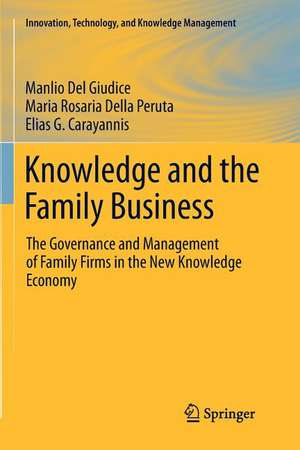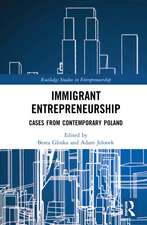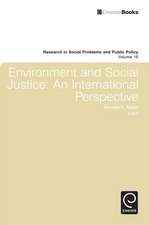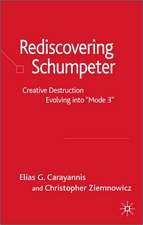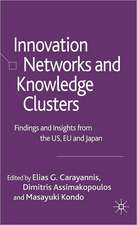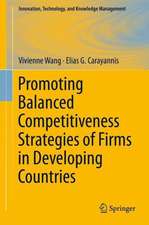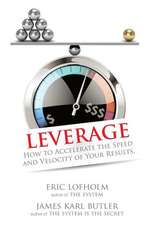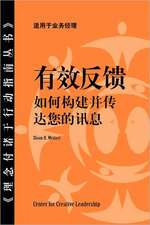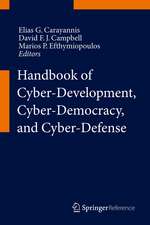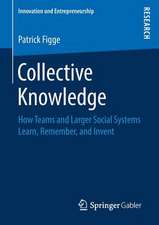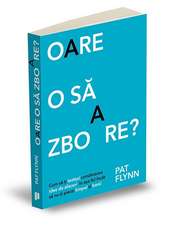Knowledge and the Family Business: The Governance and Management of Family Firms in the New Knowledge Economy: Innovation, Technology, and Knowledge Management
Autor Manlio Del Giudice, Maria Rosaria Della Peruta, Elias G. Carayannisen Limba Engleză Paperback – 27 dec 2012
| Toate formatele și edițiile | Preț | Express |
|---|---|---|
| Paperback (1) | 943.73 lei 6-8 săpt. | |
| Springer – 27 dec 2012 | 943.73 lei 6-8 săpt. | |
| Hardback (1) | 949.73 lei 6-8 săpt. | |
| Springer – 25 noi 2010 | 949.73 lei 6-8 săpt. |
Din seria Innovation, Technology, and Knowledge Management
- 15%
 Preț: 643.99 lei
Preț: 643.99 lei -
 Preț: 281.97 lei
Preț: 281.97 lei - 20%
 Preț: 815.22 lei
Preț: 815.22 lei - 18%
 Preț: 954.62 lei
Preț: 954.62 lei - 18%
 Preț: 890.54 lei
Preț: 890.54 lei - 15%
 Preț: 640.06 lei
Preț: 640.06 lei - 15%
 Preț: 633.02 lei
Preț: 633.02 lei -
 Preț: 383.93 lei
Preț: 383.93 lei - 15%
 Preț: 653.14 lei
Preț: 653.14 lei - 18%
 Preț: 945.62 lei
Preț: 945.62 lei - 18%
 Preț: 1124.60 lei
Preț: 1124.60 lei - 15%
 Preț: 655.13 lei
Preț: 655.13 lei - 20%
 Preț: 570.97 lei
Preț: 570.97 lei - 15%
 Preț: 642.03 lei
Preț: 642.03 lei - 18%
 Preț: 941.50 lei
Preț: 941.50 lei -
 Preț: 389.49 lei
Preț: 389.49 lei - 15%
 Preț: 643.00 lei
Preț: 643.00 lei - 18%
 Preț: 732.52 lei
Preț: 732.52 lei - 15%
 Preț: 637.59 lei
Preț: 637.59 lei - 18%
 Preț: 890.06 lei
Preț: 890.06 lei - 15%
 Preț: 635.47 lei
Preț: 635.47 lei - 15%
 Preț: 638.57 lei
Preț: 638.57 lei - 18%
 Preț: 956.81 lei
Preț: 956.81 lei -
 Preț: 391.99 lei
Preț: 391.99 lei - 15%
 Preț: 632.22 lei
Preț: 632.22 lei -
 Preț: 391.99 lei
Preț: 391.99 lei - 20%
 Preț: 584.75 lei
Preț: 584.75 lei - 15%
 Preț: 642.18 lei
Preț: 642.18 lei - 18%
 Preț: 894.16 lei
Preț: 894.16 lei - 15%
 Preț: 644.49 lei
Preț: 644.49 lei - 18%
 Preț: 947.85 lei
Preț: 947.85 lei - 15%
 Preț: 656.89 lei
Preț: 656.89 lei - 18%
 Preț: 954.45 lei
Preț: 954.45 lei - 18%
 Preț: 1006.72 lei
Preț: 1006.72 lei - 18%
 Preț: 727.31 lei
Preț: 727.31 lei - 15%
 Preț: 642.51 lei
Preț: 642.51 lei - 18%
 Preț: 953.65 lei
Preț: 953.65 lei - 15%
 Preț: 639.59 lei
Preț: 639.59 lei - 15%
 Preț: 645.47 lei
Preț: 645.47 lei - 18%
 Preț: 952.26 lei
Preț: 952.26 lei
Preț: 943.73 lei
Preț vechi: 1150.89 lei
-18% Nou
Puncte Express: 1416
Preț estimativ în valută:
180.64€ • 196.28$ • 151.84£
180.64€ • 196.28$ • 151.84£
Carte tipărită la comandă
Livrare economică 22 aprilie-06 mai
Preluare comenzi: 021 569.72.76
Specificații
ISBN-13: 9781461427667
ISBN-10: 1461427665
Pagini: 280
Ilustrații: IX, 267 p.
Dimensiuni: 155 x 235 x 15 mm
Greutate: 0.4 kg
Ediția:2011
Editura: Springer
Colecția Springer
Seria Innovation, Technology, and Knowledge Management
Locul publicării:New York, NY, United States
ISBN-10: 1461427665
Pagini: 280
Ilustrații: IX, 267 p.
Dimensiuni: 155 x 235 x 15 mm
Greutate: 0.4 kg
Ediția:2011
Editura: Springer
Colecția Springer
Seria Innovation, Technology, and Knowledge Management
Locul publicării:New York, NY, United States
Public țintă
ResearchCuprins
1. Family Business: Definition, Nature, and Significance .- 2. Knowledge as a Factor in the Theory of Family Business.- 3. Knowledge – Substance and Application: Tacit/Explicit Knowledge.- 4. Social Features of Knowledge Transfer.- 5. Learning and Knowledge in Behavioral Theory.- 6. Practice of Organizational Learning: Identification, Generation/Creation, Diffusion, Integration/Modification, Action.- 7. Intellectual Capital and Knowledge Management in Family Businesses.- 8. Continuity versus Change in Learning Strategies.- 9. Emotions and Emotional Climate.- 10. New Models of Leadership: Leaders as Learners and Teachers.- 11. The Identity Frame and Conflict Management.- 12. Reflections on the Dynamics of the Field and Challenges for the Future.
Textul de pe ultima copertă
Family businesses—the predominant form of business organization around the world—can make numerous, critical contributions to the economy and family well-being in both financial and qualitative terms. But dysfunctional family businesses can be difficult to manage, painful experiences at best, and they can destroy family wealth and personal relationships. This book explores the dynamics of family business management, in the context of constantly changing market conditions and the role that knowledge management plays in strategic planning and adaptation. Integrating the literature from family business, entrepreneurship, industrial psychology, and knowledge management, and with illustrative examples from a variety of enterprises, the authors address such topics as:•How family businesses can compete in the new knowledge economy•How to manage a family business when knowledge is its main asset•How to transfer knowledge (and how to keep it alive) through family generationsWithin this framework, the authors argue that effective resource management—especially intangible resources—is central to enabling a family-run organization to maintain a sustainable competitive advantage over time. They note that families often develop systemic, intuitive, or tacit knowledge that transcends rational decision making and needs to be recognized and nurtured as a distinctive asset. The authors demonstrate that trans-generational value is achieved when the family firm innovates and adapts itself to changing external and internal conditions. This kind of entrepreneurial performance requires dynamic capabilities and processes designed to acquire, exchange, combine and even shed knowledge and practices; and, in turn, dynamic capabilities result from mechanisms of knowledge sharing, collective learning, experience accumulation, and transfer.
Caracteristici
First book to explore the dynamics of family business from a knowledge management perspective Integrates the literature on entrepreneurship, family business, and knowledge management International coverage
